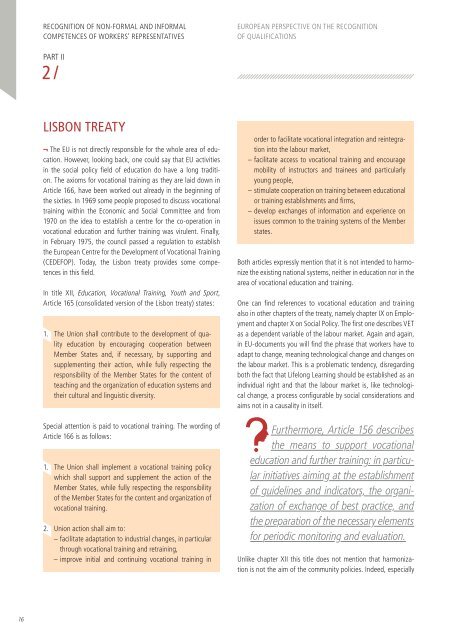RECOGNITION OF NON-FORMAL AND INFORMAL ... - Solidar
RECOGNITION OF NON-FORMAL AND INFORMAL ... - Solidar
RECOGNITION OF NON-FORMAL AND INFORMAL ... - Solidar
You also want an ePaper? Increase the reach of your titles
YUMPU automatically turns print PDFs into web optimized ePapers that Google loves.
<strong>RECOGNITION</strong> <strong>OF</strong> <strong>NON</strong>-<strong>FORMAL</strong> <strong>AND</strong> IN<strong>FORMAL</strong><br />
COMPETENCES <strong>OF</strong> WORKERS’ REPRESENTATIVES<br />
EUROPEAN PERSPECTIVE ON THE <strong>RECOGNITION</strong><br />
<strong>OF</strong> QUALIFICATIONS<br />
PART II<br />
2 /<br />
LISBON TREATY<br />
¬ The EU is not directly responsible for the whole area of education.<br />
However, looking back, one could say that EU activities<br />
in the social policy fi eld of education do have a long tradition.<br />
The axioms for vocational training as they are laid down in<br />
Article 166, have been worked out already in the beginning of<br />
the sixties. In 1969 some people proposed to discuss vocational<br />
training within the Economic and Social Committee and from<br />
1970 on the idea to establish a centre for the co-operation in<br />
vocational education and further training was virulent. Finally,<br />
in February 1975, the council passed a regulation to establish<br />
the European Centre for the Development of Vocational Training<br />
(CEDEFOP). Today, the Lisbon treaty provides some competences<br />
in this fi eld.<br />
In title XII, Education, Vocational Training, Youth and Sport,<br />
Article 165 (consolidated version of the Lisbon treaty) states:<br />
1. The Union shall contribute to the development of quality<br />
education by encouraging cooperation between<br />
Member States and, if necessary, by supporting and<br />
supplementing their action, while fully respecting the<br />
responsibility of the Member States for the content of<br />
teaching and the organization of education systems and<br />
their cultural and linguistic diversity.<br />
Special attention is paid to vocational training. The wording of<br />
Article 166 is as follows:<br />
1. The Union shall implement a vocational training policy<br />
which shall support and supplement the action of the<br />
Member States, while fully respecting the responsibility<br />
of the Member States for the content and organization of<br />
vocational training.<br />
2. Union action shall aim to:<br />
– facilitate adaptation to industrial changes, in particular<br />
through vocational training and retraining,<br />
– improve initial and continuing vocational training in<br />
order to facilitate vocational integration and reintegration<br />
into the labour market,<br />
– facilitate access to vocational training and encourage<br />
mobility of instructors and trainees and particularly<br />
young people,<br />
– stimulate cooperation on training between educational<br />
or training establishments and fi rms,<br />
– develop exchanges of information and experience on<br />
issues common to the training systems of the Member<br />
states.<br />
Both articles expressly mention that it is not intended to harmonize<br />
the existing national systems, neither in education nor in the<br />
area of vocational education and training.<br />
One can fi nd references to vocational education and training<br />
also in other chapters of the treaty, namely chapter IX on Employment<br />
and chapter X on Social Policy. The fi rst one describes VET<br />
as a dependent variable of the labour market. Again and again,<br />
in EU-documents you will fi nd the phrase that workers have to<br />
adapt to change, meaning technological change and changes on<br />
the labour market. This is a problematic tendency, disregarding<br />
both the fact that Lifelong Learning should be established as an<br />
individual right and that the labour market is, like technological<br />
change, a process confi gurable by social considerations and<br />
aims not in a causality in itself.<br />
Furthermore, Article 156 describes<br />
the means to support vocational<br />
education and further training: in particular<br />
initiatives aiming at the establishment<br />
of guidelines and indicators, the organization<br />
of exchange of best practice, and<br />
the preparation of the necessary elements<br />
for periodic monitoring and evaluation.<br />
Unlike chapter XII this title does not mention that harmonization<br />
is not the aim of the community policies. Indeed, especially<br />
16
















